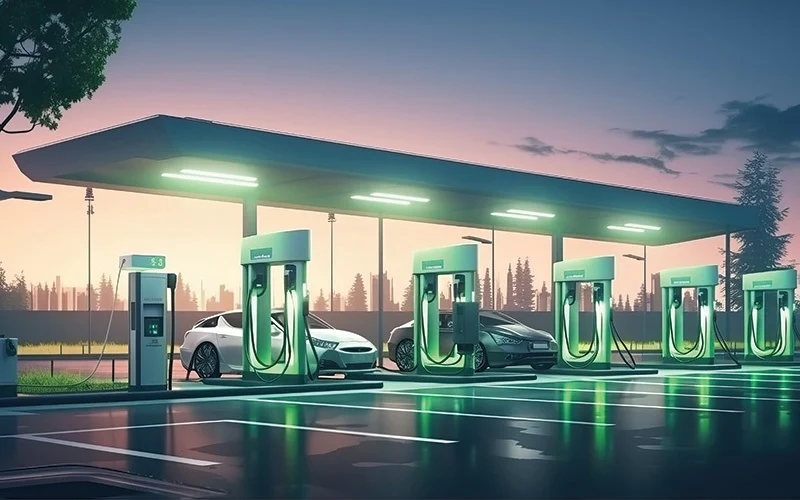
BY: Dr Anshul Gupta, Managing Director, Okaya Electric Vehicles
With conscious consumerism gaining traction and individuals embracing environment-friendly choices, sustainability has become a norm. From something as basic as clothing to something as major as vehicles, the modern-day generation is increasingly gravitating towards eco-friendly options. Amidst the rise of sustainable choices, one noteworthy alternative that has gained prominence is electric vehicles. According to a study by IMARC Group, the India electric vehicle market size reached $772 Million in 2022 and is projected to reach $19,980 Million by 2028, demonstrating a remarkable growth rate (CAGR) of 69% during 2023-2028.
As the demand for EVs continues to surge, the establishment of a comprehensive and efficient charging network becomes essential. Equipped with numerous advantages such as cost savings, ease of use, and decreased greenhouse gas emissions, electric vehicle charging stations play a crucial role in facilitating the shift towards a more environmentally friendly and sustainable transportation infrastructure. The market for electric car charging stations in India is anticipated to expand at a compound annual growth rate of about 25% throughout the forecast period(2023-2028), according to a Mordor intelligence report.
As the population grows, so does the demand for vehicles, underscoring the need of EVs and a robust charging infrastructure
Below given are the business opportunities and benefits of EV charging stations:
Cost-effective: EV charging stations provide a cost-friendly alternative compared to conventional petrol pumps, offering quick and hassle-free charging. Installing a station requires a low initial investment, ranging from 50,000 rupees for AC charges to 3 lakh rupees for DC chargers, making it easily affordable and accessible for anyone and everyone. Moreover, traditional petrol pump installation involves a number of formalities and regulations. As opposed to this, EV charging stations are easy to set up and relieve users of the stress of completing numerous paperwork.Given the easy availability and accessibility of charging stations, EV owners can charge their vehicles anywhere and everywhere, getting past their ‘range of anxiety’. Additionally, for companies with vehicle fleets, these robust charging stations lead to significant reductions in fuel and maintenance costs, enhancing business cost-efficiency.
Convenient and profit-oriented: When it comes to setting up an EV charging station, there is no additional or special space required. Individuals can easily put a station within their homes and charge at their own convenience. Similarly, hotel and mall owners can place the station in their parking lots and charge between 15 and 25 rupees per unit, allowing guests to charge their vehicles at their own discretion. A robust 3 nos EV charger can charge three electric cars simultaneously, making it an efficient choice for modern-day individuals as it will eliminate the time and effort spent on visiting traditional gas stations.
Reduced energy dependence: Addressing climate change, EV charging stations represent a substantial step toward promoting energy independence and sustainable transportation. Given the fact that electricity can be generated from renewable energy sources, these stations prove to be an ideal choice for the future. Diminishing reliance on fossil fuels, solar EV charging stations, in particular, enhance energy security and cultivate a greener energy ecosystem. Not only are these stations inexpensive and easy to install, but they also do not require additional electricity from the grid. Consequently, utilizing these stations to charge electric vehicles significantly reduces the carbon footprint caused by using electricity.
Promoting environmental sustainability: Amidst the growing environmental concerns, electric vehicles have emerged as a viable solution, promoting a sustainable transportation system. Their charging stations, like electric vehicles themselves, are also ecologically sound, and do not require any paperwork or permission to set up, encouraging environment enthusiasts to make the switch. Beyond petrol and diesel cars, electric vehicle charging stations reduce dependency on fossil fuels while also reducing greenhouse gas emissions.
Digitalized: Unlike conventional petrol stations, an EV charging station does not require manpower for setup or operation. The entire digitalized setup simplifies installation for anyone, ensuring ease and comfort. In addition to convenience, this digital approach also cuts costs of putting up a station, making it an ideal alternative for all.
EV charging stations: Unlocking a pathway to a sustainable future
India is projected to have 102 million EVs by 2030, with 2.9 million public charging stations needed to support the rapid EV usage, according to KPMG. The demand for electric vehicles and the charging infrastructure to support them will only grow as we transition to a greener and more sustainable transportation system. Moreover, a series of initiatives introduced by the Indian government including, reducing the GST on EVs, allowing private charging at homes and workplaces, exempting EVs from permit requirements, waiving road tax, and installing infrastructure and charging stations in both private and public buildings are also propelling the adoption of EV in the country, necessitating the need for a robust EV charging structure.
To establish an efficient charging infrastructure, it is crucial to understand charging demands, examine traffic patterns, and assess the impact of EVs on power grids. Collaborative efforts between the government and the private sector can lead to the development of reliable and resilient charging networks, facilitating the adoption of electric vehicles and paving the way for a sustainable and eco-friendly future.
